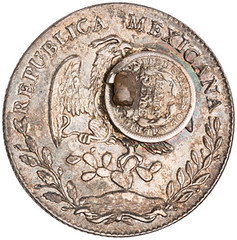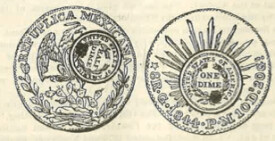
PREV ARTICLE
NEXT ARTICLE
FULL ISSUE
PREV FULL ISSUE
THE MEXICAN-AMERICAN ‘DOLLAR,’ CIRCA 1877
In the November 11, 2015 issue of the American Numismatic Society's Pocket Change blog, Matthew Wittmann highlights a very
unusual hybrid Mexican-American "coin" with a fascinating story. -Editor
 
A few weeks back the ANS put together a display for the U.S.-Mexican Numismatic Association that included some of the highlights of our collection of Mexican coins and currency. Among the most remarked upon pieces was a rather unusual Mexican-American ‘dollar,’ which in actuality consists of an 1874 Republic of Mexico 8 reales, an 1850s-era US half dime, and a circa 1875 US dime. As you can hopefully make out in the photo ..., a copper rivet was driven through the three coins to join them together. Explaining exactly why someone would do this is a rather complicated story. Let us begin with the Mexican coin, which was struck at the Guanajuato mint in 1874 and is of the traditional “Cap & Rays” design. During these years the Republic of Mexico was attempting to transition to a decimal-based monetary system centered on the peso, but the older Spanish real denominations proved so durable that they continued to be produced alongside the decimal currency. But what mattered in this case was not really the denomination, but the silver content of the coin. Generally speaking, countries at the time wanted the commodity value of their currency to be roughly equal to its nominal value. With the discovery and exploitation of vast silver deposits in the American West during the 1860s and 1870s, the price of silver declined as the supply increased. As the amount of silver used in particular coins stayed the same, their commodity value correspondingly decreased. A Mexican 8 reales, for example, contained around 377 grains of pure silver, and during the first half of the nineteenth century when the price of silver was stable, its commodity and nominal value corresponded, i.e. it was worth about $1 US as both circulating currency and as silver bullion. As the increasing abundance of silver in the 1870s drove down its price, the value of the Mexican 8 reales as silver bullion depreciated to where it became worth significantly less than a US dollar. The reason that this was significant was because the Mexican 8 reales was freely circulating in the southwestern United States during the 1870s, as there was a general want for silver coinage in the region. As the price of silver declined, people soon discovered that their “Mexican dollars” that had been circulating at par with the US dollar were now only being redeemed by banks for around 85 cents. Whoever made this unusual coin came up with a novel solution to the problem. Hammering a dime (10¢) and half dime (5¢) together with the Mexican coin brought the value of the amalgamated piece to one US dollar.
During this time (1871-79 ) we resided in the great southhwest. For a period of about fifteen years silver had been driven from circulation and was rarely seen, paper currency having almost entirely taken its place. Long about 1877 the banks in the section began the importation of Mexican dollars in great quantities which were eagerly taken up into circulation at par, but in the course of a couple of years silver had so fluctuated in value that the banks would only redeem them at eighty five cents. This was the condition of things in 1879. It must have been between 1877 and 1879 that the brilliant idea presented itself to the author of this combination of combining these coins in a substantial and permanent way. But it could not have been long after ere the piece which was partly bullion became entirely so, and became a fit subject for the curio portion of the numismatic cabinet. If you have seen a similar piece, please do let us know! To read the complete article, see:
Wayne Homren, Editor The Numismatic Bibliomania Society is a non-profit organization promoting numismatic literature. See our web site at coinbooks.org. To submit items for publication in The E-Sylum, write to the Editor at this address: whomren@gmail.com To subscribe go to: https://my.binhost.com/lists/listinfo/esylum All Rights Reserved. NBS Home Page Contact the NBS webmaster 
|
